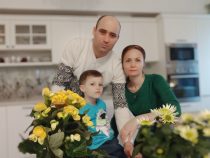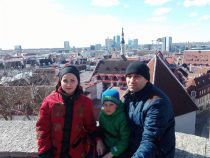The Human Rights Centre is going to defend in court Mohammed, who has lived in Estonia with his family for a decade and has not been granted citizenship by the state. Namely, an Estonian citizen cannot have the citizenship of another country at the same time, but it is practically impossible for Mohammed to get rid of his Syrian citizenship. The Centre considers that becoming a citizen of Estonia must not be hindered by the fact that the country of birth does not release a person from citizenship. Every family has the right to a secure cohabitation and the acquisition of citizenship is essential to guarantee the rights of Mohammed and his family.
Syrian Mohammed and Tanja from Estonia fell in love during their studies in St. Petersburg. In 2007, they married in Tanja’s hometown of Tartu, and since 2011 Mohammed has lived here permanently with his family with an Estonian residence permit. During this time, he has adapted well to Estonia – Mohammed has his own company, he has learned to speak Estonian, and has also graduated from a Tallinn School of Service with a degree in confectionery. Mohammed and Tanja, who are raising a 7-year-old son, are very satisfied with their lives in Estonia and Mohammed wants to become an Estonian citizen. According to him, it would give him confidence that he is a valued member of Estonian society and that the state will protect him.

“I have lived in Estonia for 10 years and I want to stay here because the most important things in my life are in Estonia – family, work, and future. In Estonia, I feel free and have a peaceful life here. If I had Estonian citizenship, I could plan my life for a longer period of time – think about business development and vacations with the family. We have not been able to do that for a long time, because my Syrian passport is no longer valid,” Mohammed said of his wishes.
Since 2019, Mohammed has applied for Estonian citizenship, but the Police and Border Guard Board has not reviewed it, as Mohammed still has Syrian citizenship. According to the law, an Estonian citizen cannot have the citizenship of another country at the same time. However, according to Syrian law, citizenship can only be renounced in special cases by a government decision, and a person is not released from citizenship as a result of his or her own will. In other words, in undemocratic Syria, which is suffering from civil war, it is virtually impossible to renounce birthright citizenship.
“No Syrian official is responding to such inquiries. I have expressed my wish, both in writing and by telephone, for the Syrian state to release me from my citizenship, but unfortunately, Syrian citizens do not have the right to renounce their citizenship by their own free will,” Mohammed said.
However, in order to become a well-deserved Estonian citizen and live happily and freely with his family in his new homeland, Mohammed appealed to the Tallinn Administrative Court in early April with the help of the Estonian Human Rights Centre.

Citizenship is a human right
“The conditions for acquiring citizenship must be equal for everyone, regardless of their country of origin. If there is no exception in the law for those who cannot renounce their citizenship for any reason, such a lack of law is discriminatory and can be considered a serious constitutional violation,” is Centre’s lawyer Uljana Ponomarjova certain.
Citizenship is a human right in this case and the Centre is going to defend Mohammed in court to stand up for his rights and Mohammed’s safe family life. “A person who has fulfilled the preconditions for Estonian citizenship, deserves it. The fact that the country of birth does not release a person from citizenship must not prevent him or her from becoming an Estonian citizen,” Uljana added.
Mohammed has fulfilled all the prerequisites that depend on him for becoming an Estonian citizen and is ready to accept both the freedoms and obligations that come with citizenship. Today, Mohammed is, in principle, in a situation where he is not protected by his country of birth or the country in which he resides. Citizenship would give Mohammed’s family security and ensure that the Estonian state stands up for his rights.
Since you are here...
It is important to protect everyone’s human rights, because it helps to keep stability and peace in the society. There are many challenges for protection of human rights in Estonia: intolerance has really come out of the closet. Bad things happen when good people are too passive, but together we can make a change.
Estonian Human Rights Centre is the competent, accountable and impactful independent human rights organisation in Estonia. Your recurring or one-time donation helps to stand up for human rights everywhere: in courts, in the media, in schools, in the workplace, on the streets and in governmental venues.
Donating is easy, and you can use your credit card if donating from abroad.
Donate nowDonate to protect a safe family life!
“In cases of strategic litigation, it is important that through one person’s court case, we can solve a bigger issue in the field of human rights, an issue that affects many people. This is exactly the case with Mohammed, because our lawsuit, in essence, concerns the Estonian state’s attitude towards people who have the right to citizenship, but whose human rights are hampered by their undemocratic home country,” said Kelly Grossthal, the Centre’s Head of Strategic Litigation.
All our strategic cases go to court thanks to supporters. You too can contribute to the safe family life of Mohammed, Tanja and their son! Thanks to donations, we can provide legal assistance to the Mohammed’s family, defend their rights in court and cover legal costs.
We are very grateful to our regular donors and to human rights friends who have made individual financial contributions. Thanks for donating!

